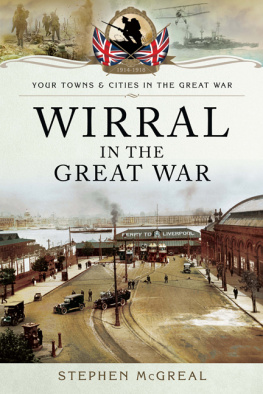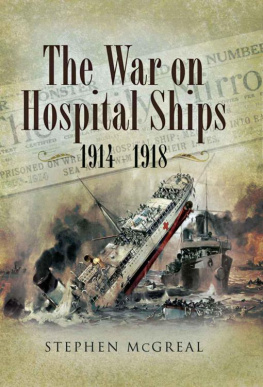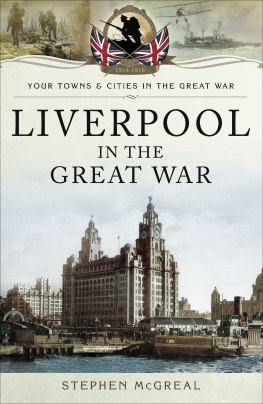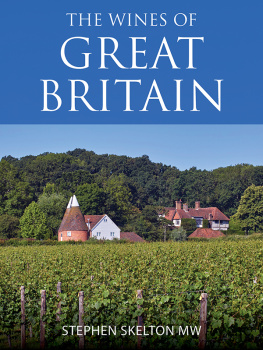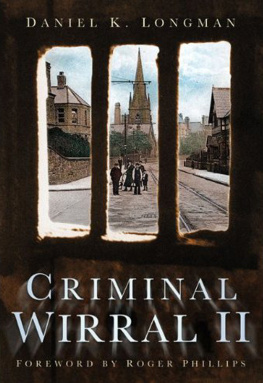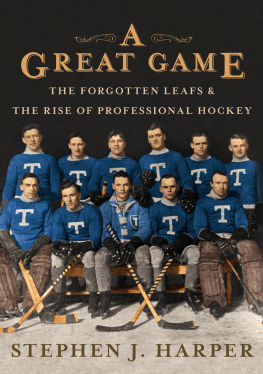Stephen McGreal - Wirral in the Great War
Here you can read online Stephen McGreal - Wirral in the Great War full text of the book (entire story) in english for free. Download pdf and epub, get meaning, cover and reviews about this ebook. year: 2014, publisher: Pen & Sword Books, genre: Romance novel. Description of the work, (preface) as well as reviews are available. Best literature library LitArk.com created for fans of good reading and offers a wide selection of genres:
Romance novel
Science fiction
Adventure
Detective
Science
History
Home and family
Prose
Art
Politics
Computer
Non-fiction
Religion
Business
Children
Humor
Choose a favorite category and find really read worthwhile books. Enjoy immersion in the world of imagination, feel the emotions of the characters or learn something new for yourself, make an fascinating discovery.
- Book:Wirral in the Great War
- Author:
- Publisher:Pen & Sword Books
- Genre:
- Year:2014
- Rating:4 / 5
- Favourites:Add to favourites
- Your mark:
- 80
- 1
- 2
- 3
- 4
- 5
Wirral in the Great War: summary, description and annotation
We offer to read an annotation, description, summary or preface (depends on what the author of the book "Wirral in the Great War" wrote himself). If you haven't found the necessary information about the book — write in the comments, we will try to find it.
Wirral in the Great War — read online for free the complete book (whole text) full work
Below is the text of the book, divided by pages. System saving the place of the last page read, allows you to conveniently read the book "Wirral in the Great War" online for free, without having to search again every time where you left off. Put a bookmark, and you can go to the page where you finished reading at any time.
Font size:
Interval:
Bookmark:

Dedicated to my daughter Stephanie
Also by Stephen McGreal and published by
Pen & Sword Books Ltd
The Cheshire Bantams.
The Zeebrugge and Ostend Raid
(Battleground Europe series).
Boesinghe (Battleground Europe series).
The War on the Hospital Ships 1914-1918.
Liverpool at War 1914-18.

First published in Great Britain in 2014 by
PEN & SWORD MILITARY
An imprint of
Pen & Sword Books Ltd
47 Church Street
Barnsley
South Yorkshire S70 2AS
Copyright Stephen McGreal, 2014
ISBN 978 1 78303 293 8
eISBN 9781473841147
The right of Stephen McGreal to be identified as author of this work has been asserted by him in accordance with the Copyright, Designs and Patents Act 1988.
A CIP catalogue record for this book is available from the British Library.
All rights reserved. No part of this book may be reproduced or transmitted in any form or by any means, electronic or mechanical including photocopying, recording or by any information storage and retrieval system, without permission from the Publisher in writing.
Printed and bound in England by
CPI Group (UK) Ltd, Croydon, CR0 4YY
Pen & Sword Books Ltd incorporates the imprints of Aviation, Atlas, Family History, Fiction, Maritime, Military, Discovery, Politics, History, Archaeology, Select, Wharncliffe Local History, Wharncliffe True Crime, Military Classics, Wharncliffe Transport, Leo Cooper, The Praetorian Press, Remember When, Seaforth Publishing and Frontline Publishing.
For a complete list of Pen & Sword titles please contact
PEN & SWORD BOOKS LIMITED
47 Church Street, Barnsley, South Yorkshire, S70 2AS, England
E-mail: enquiries@pen-and-sword.co.uk
Website: www.pen-and-sword.co.uk
Acknowledgements

To faithfully encompass the conditions prevailing upon the home front, the author has extensively consulted contemporary (and government censored) local newspapers. The author wishes to thank the following people for their assistance in producing this work:
My long suffering friend Roni Wilkinson of Pen & Sword for his faith in my deliverance of a worthy addition to the Town & Cities series, and of course his customary patience and good humour as he turns another sows ear into a silk purse.
Irene Moore for editing this work.
Fellow author Ian Boumphrey for kindly providing several scarce images from his outstanding collection of local postcards.
Peter Blackmore for sharing his Wallasey Town Hall hospital images.
The staff at Wirral Archives service, where I spent long hours scouring original editions of the Birkenhead newspapers.
Staff at Earlsden Road Reference Library for making available to this project the original editions of the Wallasey News .
The staff at Borough Road Reference Library for their interest in the project and allowing the reproduction of images from the Harding, Rathore albums. All other images are from the authors postcard collection and archive.
Introduction

The focus of commemoration during the centenary years of the First World War, will inevitably concentrate on the war of attrition and the appalling cost in human life suffered by all belligerents. The casualty figures will understandably highlight the consequences of the war of attrition, and perhaps omit any reference to the civilians killed on the home front due to enemy action. From 1914, defenceless women and children endured for the first time the horror of air raids, naval bombardments, black outs and food rationing. Dining tables across the land soon had vacant seats when men responded to Kitcheners call to arms or compulsory military service; many failed to return or came home broken in body or mind. In France, Britains small professional army faced a David and Goliath battle but lacked the deadly slingshot to smite the most powerful military machine in the world Germany.
An unprecedented arms race ensued, as all nations strove to deliver the tools and manpower so desperately needed in the front line. In doing so, the home front responded magnificently to the call Feed the Guns, the British war effort would involve, in one form or other, almost every inhabitant over school age. In 1798, income tax was implemented in Britain, to fund weapons and equipment for the Napoleonic wars, but taxation alone was inadequate to finance a twentieth century mechanised war. Every normal civilian activity became a means of fund raising, each day was equivalent to Red Nose Day, Children In Need Day and every other worthy cause rolled into one. The Great War was greatly financed by people, who asked for and received nothing what so ever from the state, but were still inspired by patriotism and allegiance to the king and the belief in their cause. This work, a long overdue ambition, explains how Wirral produced the all important sinews of war.

CHAPTER 1
A Summary of Nineteenth
Century Wirral

In the North West of England lies the Wirral peninsula, originally the northern extremity of Cheshire until 1972 when political boundary changes resulted in the northern part becoming part of Merseyside. Wirral is approximately fifteen miles long by seven wide and almost surrounded by water, for it is bounded on the west by the River Dee and to the east by the River Mersey; the tidal estuaries of both rivers flow northwards and merge into the Irish Sea. The two principal Wirral towns are Birkenhead and Wallasey separated by a watery expanse of now almost redundant docklands, currently scheduled for a spectacular 4.5 billion re-development.
Along the more industrialised coast of Wirral flows the once bustling River Mersey, whose banks and quays appeared to offer employment in one form or other to most Merseyside families. On the Cheshire bank of the river, the first docks were opened in 1847 around the Wallasey Pool, through which ran an imaginary demarcation line separating both townships. The development of Birkenhead docks required the construction of a wall across the mouth of the pool and the damming up of the water behind it created the Great Float, around which quays and warehouses slowly developed. The new venture heralded a period of rivalry on both banks of the Mersey until 1855, when Liverpool Corporation purchased the rights of the Birkenhead Dock Trustees, bringing the control of Liverpool and Birkenhead docks under one authority. It was a shrewd move to ensure the Wirral docklands could never threaten the prosperity of the port of Liverpool by undercutting their high port fees.

Wallasey Town Hall
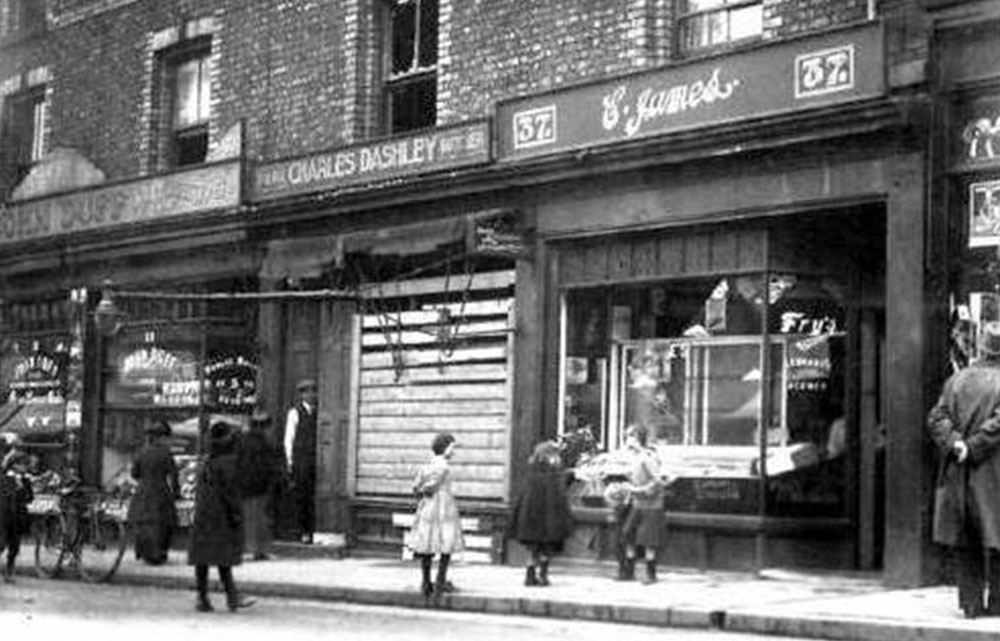
The above picture of 35 Oxton Road, Birkenhead shows the destroyed pork butchers shop of Charles Dashley. The German owner Karl Deuschie, anglicised his name when he arrived here in 1896, his former shop is now a repair centre.
Font size:
Interval:
Bookmark:
Similar books «Wirral in the Great War»
Look at similar books to Wirral in the Great War. We have selected literature similar in name and meaning in the hope of providing readers with more options to find new, interesting, not yet read works.
Discussion, reviews of the book Wirral in the Great War and just readers' own opinions. Leave your comments, write what you think about the work, its meaning or the main characters. Specify what exactly you liked and what you didn't like, and why you think so.

